This year I was in Sydney during the mating season of the Giant Cuttlefish. At the end of the mating season, around July, the adults who have mated decline and die.
Their color-changing skin fades and is lost. Their eyes go cloudy. Eventually the cuttlefish is unable to defend itself, and unable also to control its height in the water column. Once the decline starts, it occurs very quickly – on a scale of days. Their health seems to drop off a cliff.
The photo above and the one below were both taken on July 9. This is a very large male cuttlefish, vigorous and colorful, roaming about and displaying.
The next two photos were taken just a few days later, on July 13. As you can see from the V-shaped scratch or scar below the left eye in every shot, this is the same individual. The colors now are duller, there is more skin lost from the scarred area on his head, and white patches are appearing on his back.
I used to feel uneasy being around the animals while this is going on, reluctant to get close or take photos. It seemed an intrusion. But this year, in two cases I followed cuttlefish near the end of life who seemed quite comfortable to have me around. Even while declining, they have ways of showing alarm if they want to. In these cases I think they knew I was there, as they maintained a reliable few feet of distance, but did not mind the company as we swam along. It was hard to watch their life fade, though.
I looked for this one again on the following days – 14th and 16th – but did not see him again.
Passing through Sydney again a few weeks ago, I was able to get out once to the same area. You’ll hardly see anything in the next shot, but under a rock ledge, behind all those fish, center-right, there is the silhouette of a very small Giant Cuttlefish, hovering and watching and keeping well back. A new generation.

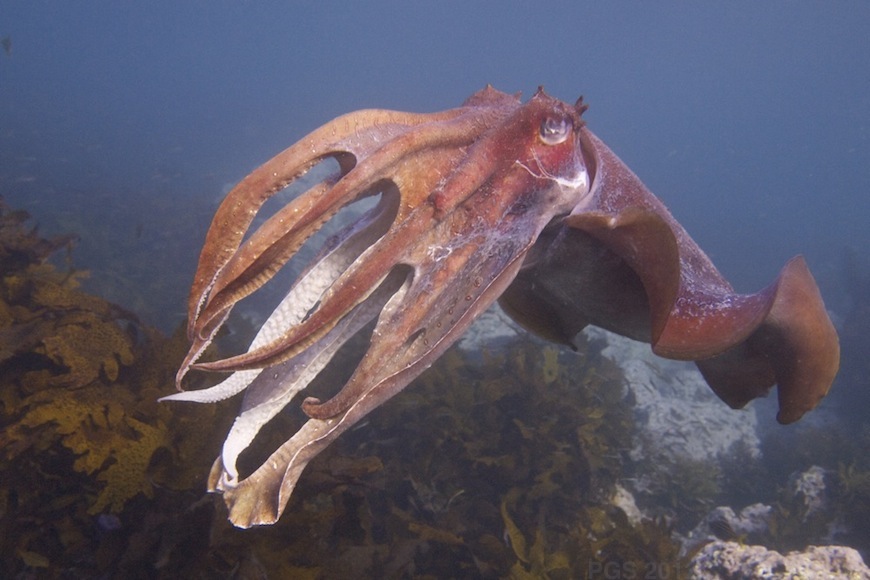
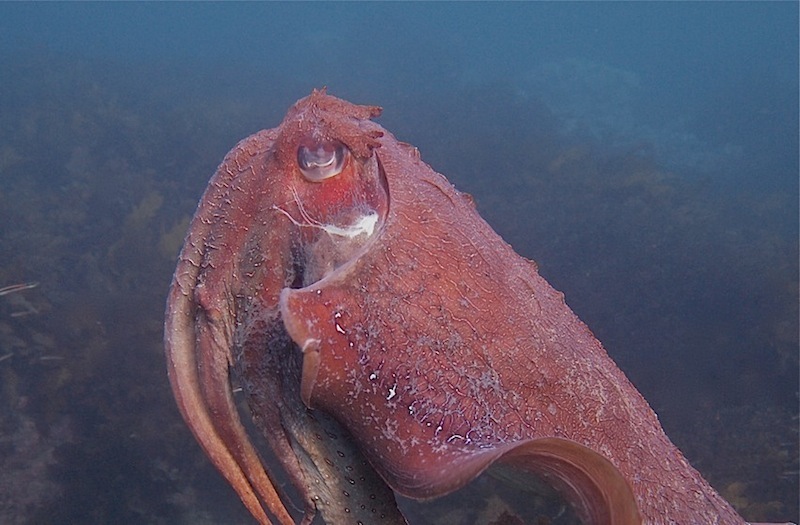
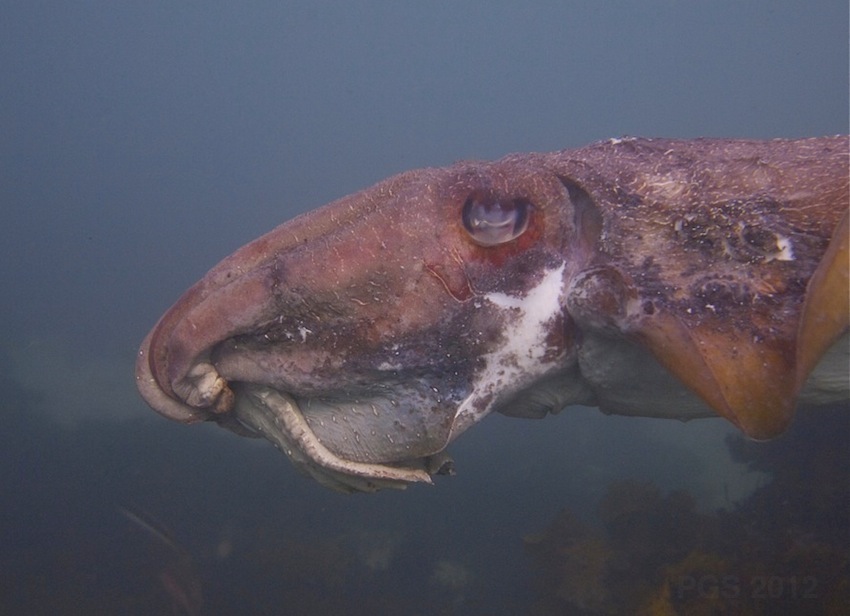
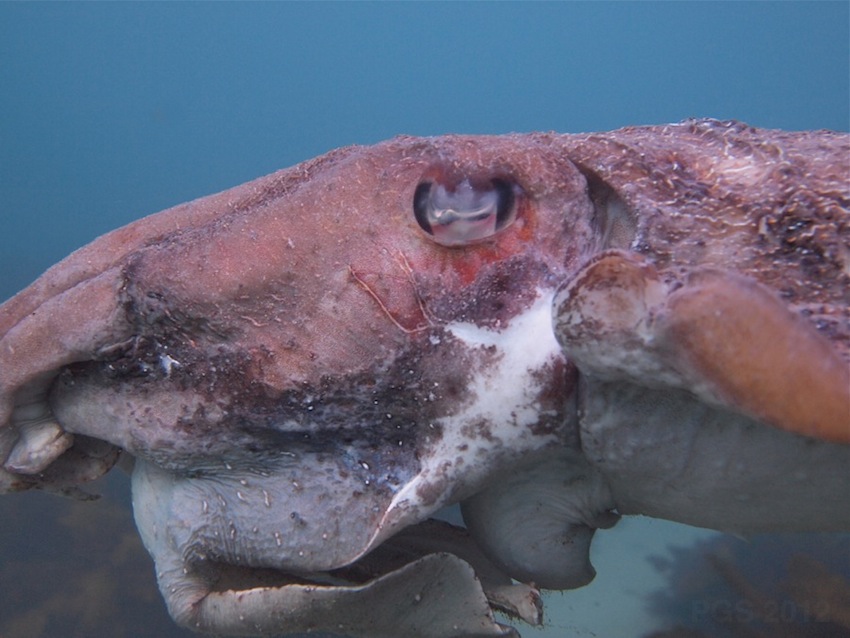
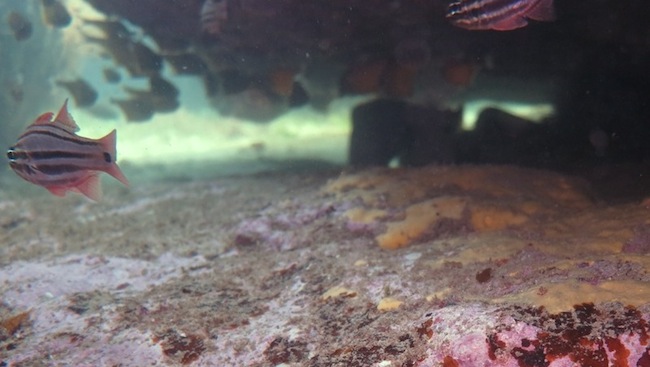
We see the same in octopuses. It appears that they may lose feeling or are so confused they don’t know where the irritation is coming from. Octos will not shoo away snails or worms in the last days and the wasted eaters know when the animal is dying (I suspect the skin starts to rot). I place octos in a breeder net to avoid the early clean-up crew but it is likely more for me than the octopus. However, the only times I have been bitten have been trying to get free of a senescent animal that I have picked up (and have handled all or most of its life. They seem to know that they won’t be bothered in my hand but will be if I put them down. The bites have been weak and I don’t think the skin was ever broken or if so, only a literal pin prick. Interestingly, this has happened with at least two and possibly a third species.
This lack of bite strength also has me wondering if the cessation of food intake has to do with an inability to break down food (chew if you will). I don’t know of any studies that examine the bucal mussel strength over time but it would be interesting to see if there is a relationship. One female octopus would literally suck in Cyclop-eeze after her young hatched (I have a video clearly showing this) but would eat nothing else. This female lived 11 weeks beyond the hatching but she only had 6 young where 50 – 100 is normal so her extended life may be related to less wear and tear on her body to produce the brood. Sadly, I have not been able to repeat having a female eat much after laying eggs and not at all after brooding. I did not do anything initially to encourage eating with this one but noticed she seemed to be eating the tiny thawed shrimp that I was feeding the hatchlings (in the same tank) and offered the food directly.
I’ve always wondered why male octopuses apparently die soon after mating (after a season or period of mating, not after a single mating), as well as females. In the case of females, it’s easy to see that brooding the eggs is very taxing and there may be no point in attempting a second round – better to invest it all in one. In the case of males, why not hang around for as long as possible? That is: why hasn’t evolution produced a longer lifespan in males? Perhaps it has.
Would it be silly to ask whether you think they have any inkling of what’s going on in those final days, and (even more ambitiously) of the nothingness that awaits? (I don’t know what answer to wish for.)
I doubt that they have an inkling of what’s going on, but I suspect that they experience a kind of new confusion. I think their eyes are not working very well towards the end – their eyes often look cloudy, and a cuttlefish sometimes seems startled to find something close by it that it would normally have noticed from much further away. I think they are confused by the changes in what they can see and how the world presents itself.
Towards the very end they seem also unable to control their buoyancy, but I doubt that this confuses them (as we might expect it to) because their faculties seem very diminished by this point.